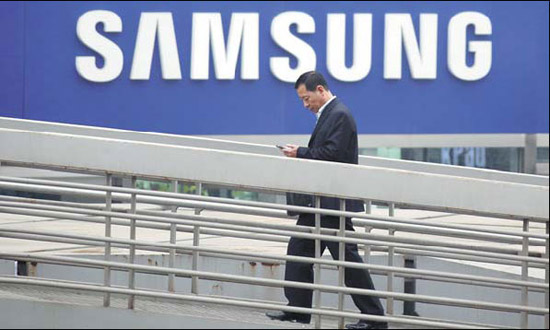
 |
| The Samsung plant will help reshape the city's industrial structure when it starts mass production in next February. Photos provided to China Daily |
The construction work for Samsung's $7-billion project in Xi'an, capital of Shaanxi province, is in full swing and scheduled to be completed by the end of this year, according to local officials.
The project's most important flash memory plant will start trial production in next February, they said.
An expressway established for the project will also be open to the public within six months.
The 5.6-kilometer four-lane highway will have a speed limit of 100 km/h.
So far, foundations for the main building and other facilities have been finished.
Workers are now busy establishing 15 types of supporting facilities, such as a sewage treatment factory, a heating center and power and water infrastructure.
The electronics giant in the Republic of Korea said it is very cautious about safety issues during construction.
A project manager said that it organizes meetings and patrols every day to highlight security.
They have also set up a training center for new workers where they can watch related videos and read books.
It also has dozens of simulated construction scenes that allow workers to practice their skills, including welding, scaffolding and high-altitude operations.
They will receive an early warning for any action that may put an employee in some kind of danger, such as falling or receiving electric shocks, the manager said.
As the largest foreign investment in China's western areas, Samsung's project focuses on the production of the world's most advanced 10-nanometer high-end flash memory chips.
To prevent exposure of this state-of-the-art chip technology, Samsung set up production bases in only two foreign cities.
One was built in 1996 in the US city of Austin, Texas, and the other is in Xi'an.
The choice of China to house the high-tech project was met with disapproval in the ROK, a Samsung senior manager said.
But the company's senior executives said the project should be located in a region with the most potential, he noted.
Because China is implementing the western development strategy and stimulating domestic demand, the markets there will be huge, he added.
Samsung has predicted that China will account for more than half of the global market share in the semiconductor industry by 2015.
Most of the chip buyers, especially the PC manufacturers, have moved their production lines there.
Investment environment
Competing with China's coastal areas, Xi'an has unique advantages, including low costs and abundant human resources, Samsung managers said.
The chip project needs a large amount of water and power resources, which are about 20 percent cheaper in Xi'an than in eastern areas.
And the company can also save 40 percent on the cost of labor.
Moreover, the city is one of the birthplaces of the Chinese electronic information industry.
Since the 1970s, Xi'an has been a major research base in the field, with China's first mobile phone, the first indigenous GPS chipset and TD-SCDMA communication technology standards emerging in the city.
Now, it has more than 50 related research institutes and 2,600 companies.
In addition, a comprehensive bonded area is also under construction in the Xi'an high-tech zone where Samsung's project is located.
The customs clearance service center in the bonded area will open in October.
According to Samsung, the company needs to import 10,000 containers of equipment before the bonded area is open.
And it could enjoy the services beforehand, allowing it to save nearly 6.2 million yuan ($1 million) in transport fees and customs charges.
The project is prompting more Fortune Global 500 companies in the industry to follow suit.
Today, an increasing number of international technology firms are flocking to Xi'an.
At an investment and trade forum between eastern and western China held in April, the high-tech zone's administrative committee signed four contracts worth 2.7 billion yuan.
Two of them are related to the Samsung project. The two investors are both the ROK's chemical companies and also important partners of Samsung. Many other Chinese and foreign companies engaged in the production of chemicals and electronic products have or will set up production bases in the zone.
















 In pictures: history of China's auto industry
In pictures: history of China's auto industry


![]()
